

Stunner: Researchers retract paper because company complains it’s hurting profits. Elsevier stopped me doing my research. I am a statistician interested in detecting potentially problematic research such as data fabrication, which results in unreliable findings and can harm policy-making, confound funding decisions, and hampers research progress.
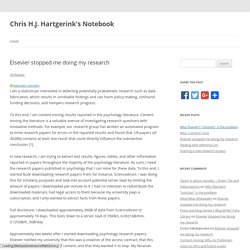
To this end, I am content mining results reported in the psychology literature. Content mining the literature is a valuable avenue of investigating research questions with innovative methods. For example, our research group has written an automated program to mine research papers for errors in the reported results and found that 1/8 papers (of 30,000) contains at least one result that could directly influence the substantive conclusion [1]. In new research, I am trying to extract test results, figures, tables, and other information reported in papers throughout the majority of the psychology literature.
Chris H.J. Hartgerink's Notebook. The prevalence of data fabrication in science has only been investigated via self-report surveys, which incorporate severe biases and only assess the prevalence amongst researchers.
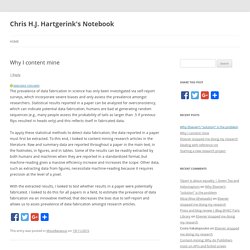
Statistical results reported in a paper can be analyzed for overconsistency, which can indicate potential data fabrication, humans are bad at generating random sequences (e.g., many people assess the probability of tails as larger than .5 if previous flips resulted in heads only) and this reflects itself in fabricated data. To apply these statistical methods to detect data fabrication, the data reported in a paper must first be extracted.
To this end, I looked to content mining research articles in the literature. Raw and summary data are reported throughout a paper in the main text, in the footnotes, in figures, and in tables. With the extracted results, I looked to test whether results in a paper were potentially fabricated. Why Elsevier’s “solution” is the problem. It has been an interesting week after I posted my story on how Elsevier has hampered my research (I described my research here).
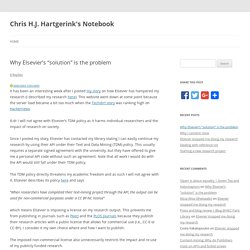
This website went down at some point because the server load became a bit too much when the Techdirt story was ranking high on Hackernews. tl;dr I will not agree with Elsevier’s TDM policy as it harms individual researchers and the impact of research on society. Since I posted my story, Elsevier has contacted my library stating I can easily continue my research by using their API under their Text and Data Mining (TDM) policy. This usually requires a separate signed agreement with the university, but they have offered to give me a personal API code without such an agreement. Note that all work I would do with the API would still fall under their TDM policy. The TDM policy directly threatens my academic freedom and as such I will not agree with it. Elsevier Says Downloading And Content-Mining Licensed Copies Of Research Papers 'Could Be Considered' Stealing. Elsevier has pretty much established itself as the most hated company in the world of academic publishing, a fact demonstrated most recently when all the editors and editorial board resigned from one of its top journals to set up their own, open access rival.
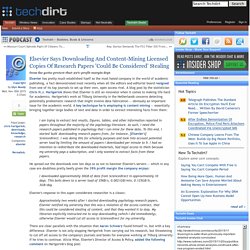
A blog post by the statistician Chris H.J. Hartgerink shows that Elsevier is still an innovator when it comes to making life hard for academics. Hartgerink's work at Tilburg University in the Netherlands concerns detecting potentially problematic research that might involve data fabrication -- obviously an important issue for the academic world. A key technique he is employing is content mining -- essentially bringing together large bodies of text and data in order to extract interesting facts from them: I am trying to extract test results, figures, tables, and other information reported in papers throughout the majority of the psychology literature.
Elsevier Says Content-Mining Research Papers 'Could Be Considered' Stealing. The title is link-bait.
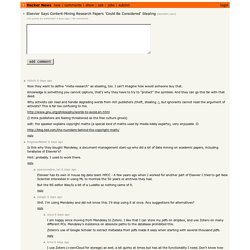
That really isn't what Elsevier is saying here. They are complaining that this researcher broke the terms for the university's subscription. On their website they state: [0] """Further, we're looking at how we ensure that researchers know what they can and cannot do with content, or where to go for further information, without giving the impression that we are claiming ownership over non-copyrightable facts and data.
""" Regarding this case, (IANAL) it seems to be that if their APIs worked properly, then Elsevier is completely in the right (especially in the UK) in demanding that papers only be accessed through the API. When yr research is illegal under current copyright laws - consider taking a risk and making your story pubic @Sentificon #opencon. Why Elseviers solution is the problem. Text-mining block prompts online response. A scientist who mines the text of research publications was blocked by the scientific publisher Elsevier from downloading large numbers of its papers — a move that he described in a blog post that was shared by many on social media.
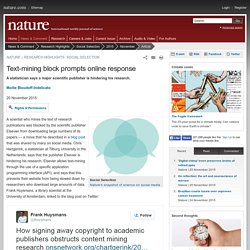
Chris Hartgerink, a statistician at Tilburg University in the Netherlands, says that the publisher Elsevier is hindering his research. Elsevier allows text-mining through the use of a specific application programming interface (API), and says that this prevents their website from being slowed down by researchers who download large amounts of data. Frank Huysmans, a library scientist at the University of Amsterdam, linked to the blog post on Twitter: Hartgerink is studying the prevalence of data fabrication in the social sciences for his doctoral project. Promovendus zet onderzoek stop door conflict met Elsevier. United Nations naspelen op topuniversiteiten.
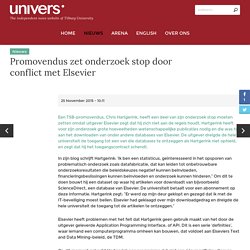
Promovendus zet onderzoek stop vanwege conflict met Elsevier. Text and data mining. Elsevier's policy We have adopted a license–based approach which both formalizes the right to mine into our academic agreements and delivers a flexible way in which researchers can gain access to our API through a self-service portal.
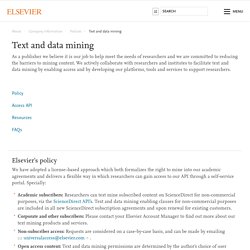
Specially: Academic subscribers: Researchers can text mine subscribed content on ScienceDirect for non-commercial purposes, via the ScienceDirect API's. Text and data mining enabling clauses for non-commercial purposes are included in all new ScienceDirect subscription agreements and upon renewal for existing customers. Corporate and other subscribers: Please contact your Elsevier Account Manager to find out more about our text mining products and services.Non-subscriber access: Requests are considered on a case-by-case basis, and can be made by emailing universalaccess@elsevier.com.Open access content: Text and data mining permissions are determined by the author's choice of user license.
Access to the API.